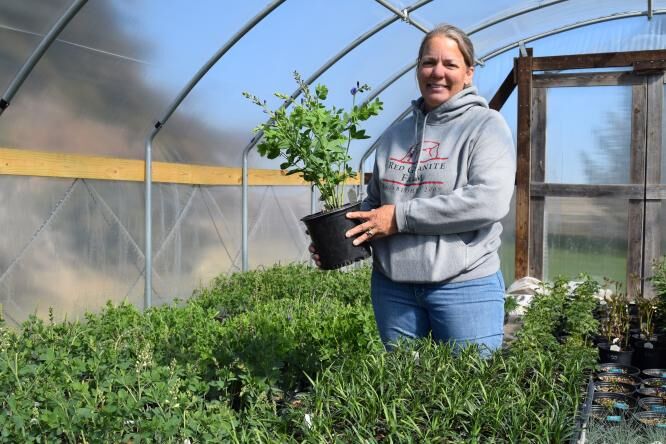When Steve and Nicole Jonas graduated from Iowa State University with horticulture degrees, both knew they wanted to farm.
In 2007, they purchased five acres of a century farm northeast of Boone. This purchase, which included a historic house and farm buildings, was the start of Red Granite Farm, a specialty crop operation that now spans 10 acres and includes poultry and perennial landscape plants, as well as fruits and vegetables.
The Jonases were successful, but it wasn’t until five years after their initial purchase that they became serious about a business plan and mapping out where they wanted the business to go. Nicole attributes the farm’s growth to lessons she learned from the nationally acclaimed program called Annie’s Project.
Annie’s has been offered by Iowa State University Extension and Outreach since 2004. It teaches women in agriculture how to be successful with farm finances, human resources, legal issues, marketing and agricultural production.
The Jonases completed Annie’s in 2012. The program that year included a special emphasis on specialty crop production – a natural fit.
Growing the business
“Our business had already been started when I took Annie’s, but we definitely benefited because the sessions are what led us to form a business plan,” said Jonas. “Even if everything didn’t all end up on paper, our mindset changed, and we learned to think differently about all of the decisions we were making.”
Thinking differently helped the Jonases plan for growth. In the following years, they hired outside help, expanded their market reach and also grew their family. Today, they have three children who help on the farm: Claire (17), Gabriel (15), and Nolan (12).
Their business growth mirrors what farm women across the country have experienced as a result of Annie’s Project. In its 20-year history, more than 19,000 people have completed Annie’s Project courses in 38 states and the U.S. Virgin Islands. In Iowa, 131 Annie’s Project courses have empowered 2,242 women in agriculture.
Partnerships
Annie’s Project courses are made possible by a strong network of partners, including the United States Department of Agriculture’s Risk Management Agency and National Institute of Food and Agriculture, county extension professionals and specialists, local experts who serve as guest speakers, and Farm Credit Services of America (FCSAmerica).
Jessica Strohman, community relations manager for FCSAmerica, said the financial cooperative supports Annie’s Project because of the many ways it helps participants expand their financial knowledge and build stronger management skills, including those that can improve relationships within a family farm.
“Women play a key role in farming and their decisions are important,” Strohman said. “At FCSAmerica, we work every day to equip our customer-owners with the know-how and insights needed to manage the financial side of their operations. Our support of Annie’s Project is an extension of our commitment to helping farmers and ranchers succeed.”
Strong leadership
John Lawrence, past vice president of ISU Extension and Outreach, said Annie’s caught on at Iowa State because of strong leadership and the recognition that more needed to be done to reach women in agriculture.
“Women, and farm women in particular, had different learning preferences and we had a group of leaders who recognized that early on and catered their outreach specifically to that audience,” said Lawrence. “Annie’s has grown dramatically in Iowa and across the country, and as a result, farm women are better informed and involved in decision making.”
He credits Madeline Schultz, program manager for Women in Agriculture at Iowa State, for helping to organize the program in its early years. Today, she serves as president of the national Annie’s Project board.
“Madeline has been instrumental in Annie’s Project and our Women in Agriculture programming in Iowa,” said Lawrence. “She has a lot of energy, certainly a passion for her work, and a skillset that has helped grow the program.”
Local offerings
In 2013, Mary Tuttle, a retired extension program coordinator in Cherokee County, Iowa, decided to bring the program to her part of the state. She met with her local farm management specialist, discussed the interest of her audience and formed an outline of who would present and the topics that would be covered. Tuttle saw a strong interest with the first offering, and held the program on three additional occasions during her extension career.
“Every class that I held, there were participants who couldn’t believe how fast the courses went. When the last class was over, they were wanting more,” said Tuttle. “The women became much more involved with the roles on their farms and more knowledgeable about what was going on.”
One of the best features, Tuttle said, is that each Annie’s Project is localized. The program relies on local experts and speakers, even though it is organized at the state and national levels.
“We had people from Iowa State involved, but we also had local experts who our women recognized,” said Tuttle. “By doing so, our participants were able to ‘put a face to the name’ so that they had someone local to talk to, even after the program was over.”
Lasting relationships
Even though it has been more than 10 years since she completed Annie’s Project, Nicole Jonas said she still interacts with those she met through the program, including another greenhouse grower from central Iowa.
“We keep in touch, we share ideas and information, and we also do business together,” said Jonas.
Her advice to other women who are considering taking Annie’s is simple and direct. “Definitely do it if you can. It not only gives you insight into business planning, but it also gives you insight into yourself. Sometimes you dream about different things. When you put them down on paper, they become more likely to happen.”
CLICK HERE to view the original article.




